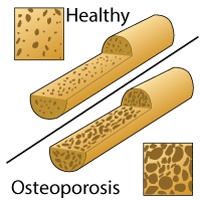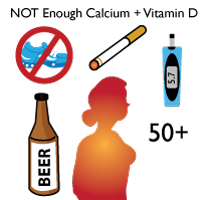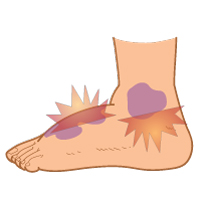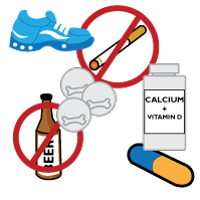 What is Osteoporosis?
What is Osteoporosis?
Osteoporosis occurs when the bones become weak and brittle due to aging and an insufficient calcium intake. This often results in bone fractures. These fractures can occur from even the smallest of hits to the outside of the foot. For example, stubbing your toe on a piece of furniture could result in a fracture for someone with osteoporosis, even if it wasn’t a hard hit. Even something like a daily walk can result stress fractures over time in someone with osteoporosis, due to the repeated footfalls.
While women who are 50 and older are at the highest risk of suffering from osteoporosis, younger people and men are also affected by the condition.
Causes
Risk factors for developing osteoporosis include:
- Being 50+
- Being a woman
- Being overweight
- Having diabetes
- Being inactive
- Diet (not enough calcium or vitamin D)
- Smoking
- Drinking alcohol
Signs & Symptoms
In many instances of osteoporosis, there are no signs and symptoms until a bone has been fractured. Signs and symptoms of a bone fracture include:
- Bruising
- Pain that goes away with rest
- Pain that worsens with physical activity
- Tenderness in the affected area
- Swelling in the foot and/or ankle area
While bone fractures heal fairly quickly in people with healthy bones, they can cause ongoing issues and take much longer to heal for people with osteoporosis.
Treatments
 Lifestyle Changes – Adding foods that are rich in calcium and vitamin D to your diet can help improve bone density. You may also want to consider taking calcium and/or vitamin D supplements. Exercising regularly will help you achieve a healthy weight and make your bones stronger. If you smoke cigarettes, you should consider quitting, as this habit can contribute to bone loss. Also, try to limit your alcohol intake.
Lifestyle Changes – Adding foods that are rich in calcium and vitamin D to your diet can help improve bone density. You may also want to consider taking calcium and/or vitamin D supplements. Exercising regularly will help you achieve a healthy weight and make your bones stronger. If you smoke cigarettes, you should consider quitting, as this habit can contribute to bone loss. Also, try to limit your alcohol intake.
Proper Footwear – If you have osteoporosis in your feet, good shoes are very important. You want something that will protect your feet from potential fractures, as well as provide support and shock absorption. A good pair of shoes can also help improve your balance.
Medications – There are medications available (Boniva, Fosamax, Reclast) that can help to prevent future bone fractures. However, these medications will come with various side effects. Talk to your doctor to see if this is the right treatment option for you.